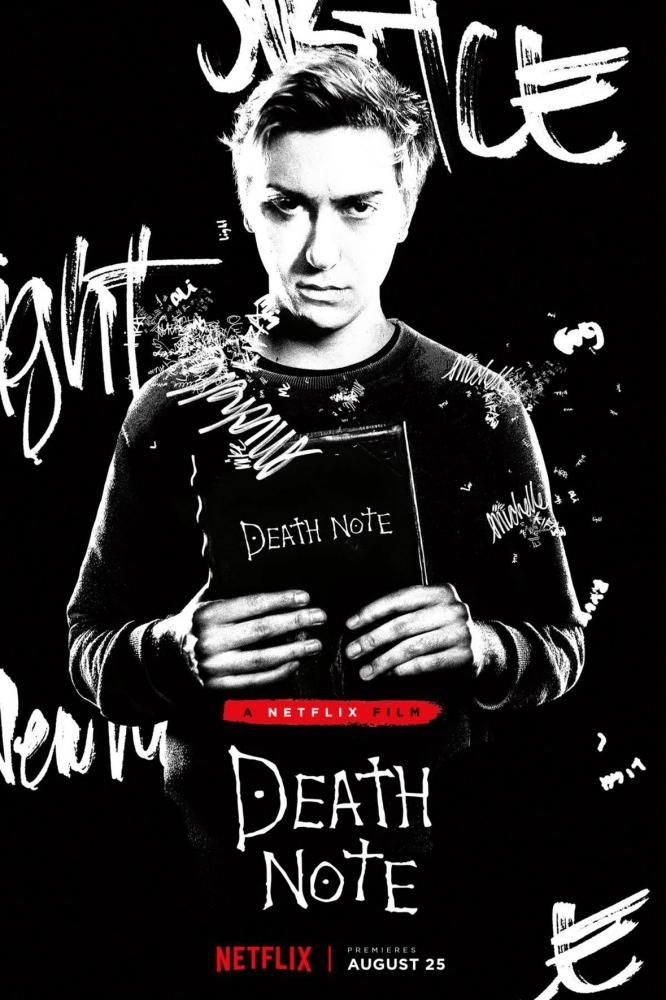Netflix’s “Death Note” – a grotesque abomination of an iconic drama
(Warning, this article contains spoilers)
September 12, 2017
Whether or not they’re a fan of anime, many people have heard of the suspenseful drama Death Note, which was adapted into a Netflix original film.
The original Death Note features Light Yagami, a high school senior at the top of his class, who discovers a notebook with the ability to kill anyone simply by writing the name of anyone.
Throughout the series, Light becomes known to the world as Kira, a god who passes judgment on criminals. The United Nations becomes worried and calls upon the services of a detective named L, who is determined to bring Kira to justice.
Netflix’s Death Note, on the other hand, features social outcast Light Turner, who does other students math homework for them.
Turner takes on the same task as Yagami, but has a VERY different personality and set of priorities than his original persona, much like the rest of the cast.
When Ryuk, a god of death known as a Shinigami, first appears to Light Yagami, Yagami is startled, but quickly recovers and sees Ryuk as his equal, if not a lower life form who just happened to be the reason of his new found abilities.
Turner, on the other hand, screams like a little girl and cowers in the corner upon the sudden appearance of the god of death, and remains afraid of him throughout most of the film.
The original Ryuk was something of a chaotic neutral, intentionally dropping the book into the human world out of boredom, and only went to Light because it is one of the rules his kind need to follow when their Death Note enters the human world. He doesn’t care how it’s used, or whether or not it’s used. He only gives the information he sees fit to give, such as how the book works but never gets involved in Light’s affairs.
Netflix Ryuk, however, is now a chaotic evil, manipulating Light to use the book and telling him to just get rid of the book if he is not going to kill anyone, almost a polar opposite of classic Ryuk.
The rest of the characters are poor copies as well, not even alike in any way other than their name. Such as Mia (originally Misa), who now does not have her own Death Note, and is a cheer leader rather than a famous model known by the world. Chief Yagami, Light’s father, is now nothing more than a local policeman, rather than a high ranking official in the NPA. L, who yes, had a sweet tooth, now always eats candy in the most disgusting way possible, goes out in public, yells accusations in public places, and is overall obnoxious, is yet another polar opposite of the calm, collected L.
Then there are the rules. The very basis of the original series, now completely different making the film just something that shares the name of a popular show.
Rule 1: The human whose name is written in this note shall die.
Rule 2: The human whose name is written in this note shall die. This note will not take effect unless the writer has the subject’s face in mind when writing his/her name. This is to prevent people who share the same name from being affected.
Rule 3: If the cause of death is written within 40 seconds of the subject’s name, it will happen.
A good start, the main rule is shared in both versions, but after that, it almost instantly becomes a completely different set of rules.
Rule 4: If the cause of death is not specified, the subject will die of a heart attack.
And almost instantly, the rule changes. In Netflix’s version, the cause of death MUST be specified in order for it to work, which is ridiculous because the heart attack was Kira’s trademark and is how he became discovered, making it so that he would have to make himself explicitly known to the world on his own in the movie.
Outside of perhaps the most important rule, Shinigami can now apparently be killed, only the owner of the Death Note can see the shinigami, and you must now use the Note at least once every seven days, rather than over a year before you lose ownership.
Not to mention, the death of Mia, while Misa was one of the few who survived the series, Light being killed by L and L’s survival, though it was originally the other way around and L’s death is the biggest turning point of the series.
This Death Note simply isn’t even same as what it was apparently based upon, and should not even share a name.
Overall, Netflix’s white washed, outrageously inaccurate interpretation truly is not worth while, especially for the fans.
However, those who are fans of films that pack in way too much action for a plot to form, extreme gore and make up for the fact that the story line dissolves into just teens being edgy, or are fans of William Dafoe, they may enjoy it (and yes, William Dafoe is quite literally the only reason I bothered continuing).
As a movie goer, and a fan of the original series, I rate Death Note a solid 0.5 out of 5 stars, and wish I could have the hour and 31 minuets I wasted watching it back (other than William Dafoe who was an outstanding Ryuk, despite the character’s clear flaws).






